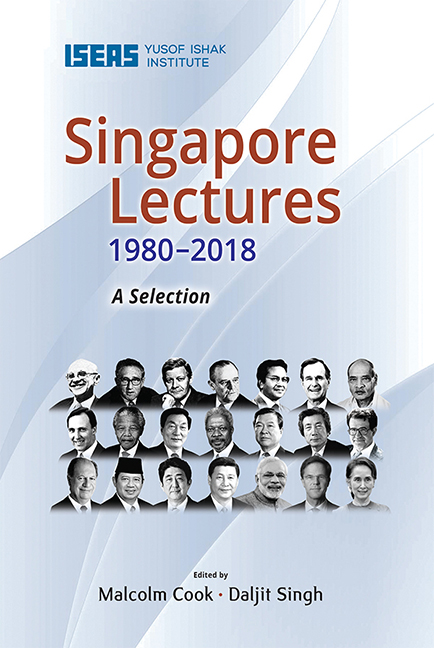Book contents
- Frontmatter
- Contents
- Introduction
- 1 The Invisible Hand in Economics and Politics
- 2 American Foreign Policy: A Global View
- 3 The Soviet Union: Challenges and Responses as Seen from the European Point of View
- 4 Trends in the International Financial System
- 5 Regionalism, Globalism and Spheres of Influence: ASEAN and the Challenge of Change into the 21st Century
- 6 US Policy in the Asia-Pacific Region: Meeting the Challenges of the Post-Cold War Era
- 7 India and the Asia-Pacific: Forging a New Relationship
- 8 Australia, Asia and the New Regionalism
- 9 South and Southern Africa into the Next Century
- 10 China and Asia in the New Century
- 11 Global Values: The United Nations and the Rule of Law in the 21st Century
- 12 Peace on the Korean Peninsula and East Asia
- 13 Japan and ASEAN in East Asia: A Sincere and Open Partnership
- 14 EU and Asia: Sharing Diversity in an Inter-regional Partnership
- 15 Global Challenges in the 21st Century: A View from Chile
- 16 Indonesia: The Challenge of Change
- 17 Japan and ASEAN, Always in Tandem: Towards a More Advantageous Win-Win Relationship through My “Three Arrows”
- 18 Forging a Strong Partnership to Enhance Prosperity of Asia
- 19 India’s Singapore Story
- 20 The Netherlands, Singapore, Our Regions, Our World: Connecting Our Common Future
- 21 Democratic Transition in Myanmar: Challenges and the Way Forward
- The Singapore Lecture Series
- The Editors
11 - Global Values: The United Nations and the Rule of Law in the 21st Century
Published online by Cambridge University Press: 09 October 2021
- Frontmatter
- Contents
- Introduction
- 1 The Invisible Hand in Economics and Politics
- 2 American Foreign Policy: A Global View
- 3 The Soviet Union: Challenges and Responses as Seen from the European Point of View
- 4 Trends in the International Financial System
- 5 Regionalism, Globalism and Spheres of Influence: ASEAN and the Challenge of Change into the 21st Century
- 6 US Policy in the Asia-Pacific Region: Meeting the Challenges of the Post-Cold War Era
- 7 India and the Asia-Pacific: Forging a New Relationship
- 8 Australia, Asia and the New Regionalism
- 9 South and Southern Africa into the Next Century
- 10 China and Asia in the New Century
- 11 Global Values: The United Nations and the Rule of Law in the 21st Century
- 12 Peace on the Korean Peninsula and East Asia
- 13 Japan and ASEAN in East Asia: A Sincere and Open Partnership
- 14 EU and Asia: Sharing Diversity in an Inter-regional Partnership
- 15 Global Challenges in the 21st Century: A View from Chile
- 16 Indonesia: The Challenge of Change
- 17 Japan and ASEAN, Always in Tandem: Towards a More Advantageous Win-Win Relationship through My “Three Arrows”
- 18 Forging a Strong Partnership to Enhance Prosperity of Asia
- 19 India’s Singapore Story
- 20 The Netherlands, Singapore, Our Regions, Our World: Connecting Our Common Future
- 21 Democratic Transition in Myanmar: Challenges and the Way Forward
- The Singapore Lecture Series
- The Editors
Summary
Kofi A. Annan, Secretary-General of the United Nations, delivered the 18th Singapore Lecture on 14 February 2000. He was introduced by Minister for Foreign Affairs and Law Professor S. Jayakumar. The lecture is an eloquent defence of the importance of international law and the need for all countries to uphold the rule of law. These issues have assumed greater salience in present times when international rules and norms are being challenged by powerful states.
Thank you, Professor Jayakumar, for that most generous introduction. You have raised expectations which I shall have difficulty living up to. Indeed, your dual credentials as scholar and policy-maker make you a hard act for any lecturer to follow.
But one thing about those credentials does give me great encouragement for the topic I have chosen to speak about in front of this very distinguished audience. And that is the fact that you are both Minister for Foreign Affairs and Minister for Law.
Offhand, I cannot think of any member state of the United Nations in which those two positions are combined. And I imagine that in some member states the combination might even be thought eccentric. People still tend to see law as an almost exclusively domestic matter, while foreign policy is seen as the realm of pragmatism and even Realpolitik—a domain where there is no law but the law of the jungle.
I am very glad to see that in Singapore you think differently. Not that you have a starry-eyed confidence in the eternally benign and law-abiding instincts of your neighbours. I know that you also set great store by being able to defend yourselves if need be, and that is certainly not something I would reproach you for. Every state enjoys the right of self-defence, under Article 51 of the United Nations Charter. And, so long as its intentions are purely and unmistakably defensive—as yours are—the fact that a state is able and willing to defend itself reduces the risk that others will attack it.
In addition, a state with strong defence forces is better able to contribute to collective security operations when the need arises.
- Type
- Chapter
- Information
- Singapore Lectures 1980-2018 , pp. 186 - 199Publisher: ISEAS–Yusof Ishak InstitutePrint publication year: 2020

